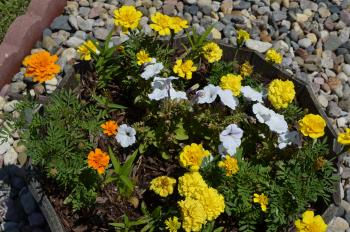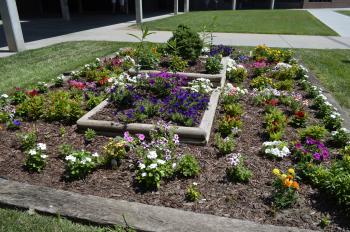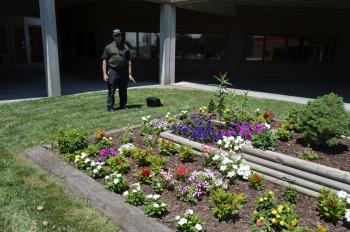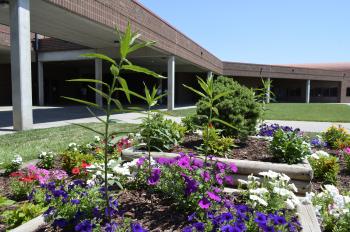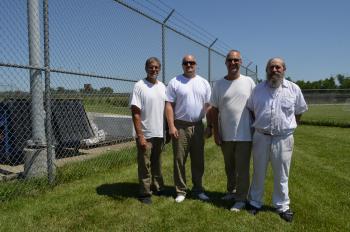Individuals at OCC create essential habitat for monarch butterflies
Individuals at OCC create essential habitat for monarch butterflies
FOR IMMEDIATE RELEASE (18-A8)
CONTACT Cara Wilwerding, Communications Manager
OFFICE 402-471-5799 | cara.wilwerding@nebraska.gov
Aug. 7, 2018 (Omaha, Neb.) – Monarch butterflies migrating through Nebraska have a much needed place to rest, thanks to several men at the Omaha Correctional Center (OCC).
The facility has partnered with the Henry Doorly Zoo and the Nebraska Wildlife Federation to give monarch butterflies a place to thrive. They are doing it by planting three different varieties of local ecotype milkweed on facility grounds. Grounds Corporal David Moore, at OCC, is leading the project.
Adult monarch butterflies only lay eggs on milkweed plants, while larvae and caterpillars eat the leaves. Creating this habitat is essential because monarchs’ population numbers have declined 90 percent over the past two decades, according to Carolyn Butler, monarch butterfly and other pollinator program coordinator for the Nebraska Wildlife Federation.
“According to experts, the migration of the monarchs from southern Mexico to Canada crosses over approximately the eastern third of our state,” Butler said. “That’s why it’s important that we all step up and make a difference.”
Six incarcerated men took on this project under Moore’s leadership, first taking a 12-week class called Always Growing with teacher Amy Sturm and a handful of other students. The class – which focused on the business elements of gardening, landscaping and personal development – used the milkweed project as a main focus for learning. Students dissected plants to understand their anatomy before the class culminated with a final landscape design project.
“I think it’s going to help them because they were able to have ownership over how they designed something and how they could affect change – not only environmentally, but emotionally as well,” Sturm said. “They were looking outside of themselves to see what isn’t growing or what isn’t working in their lives and what they can do to make that better.”
After completing the course, the team began planting milkweed seeds in a greenhouse in March, moving them outside in late May. They saw their first three monarchs in early July, and numbers have only increased since then.
“It’s good to see things coming to fruition,” participant Ed Segura said. “It makes the yard look a bit nicer too.”
Moore, who echoed Segura’s sentiment, said, “I think it has a calming effect – having the flowers and butterflies around. I think it’s a good deal to help them (incarcerated men) feel better about themselves.”
In addition to the planting project and Always Growing class, participants had the opportunity to study for their pesticide applicators license through Metropolitan Community College (MCC). Four participants – Segura, Jason Randolph, Daniel Owens and Montgomery Angley – received their licenses, which are honored throughout the state of Nebraska. Learning how to use pesticides sparingly, if at all, is a key aspect of establishing effective pollinator habitats.
“I can definitely use the certification when I get out,” Owens said. “I have a cousin who got certified and started his own business, so maybe I could get in with him.”
While the participants continue their achievements and planning for the future, Moore has further aspirations for the milkweed project as well. With nearly 30 years of years of landscaping experience, he plans to lead participants in planting four more pollinator gardens throughout the facility in September, with the hopes of attracting even more pollinators. Moore and the men will also install a larger greenhouse for pollinator plants, crops and flowers by October. Eventually, he would like to use plants developed in the gardens and the greenhouse to start gardens at underprivileged area schools – paying it forward and furthering statewide growth.
“We’re starting small with the garden, but we really hope to see this expand to a much more comprehensive program to create a more effective habitat in Nebraska communities,” Butler said of the ongoing project. “It’s an all-around win for prisoners, pollinators and other people.”
###
See attached photos.

